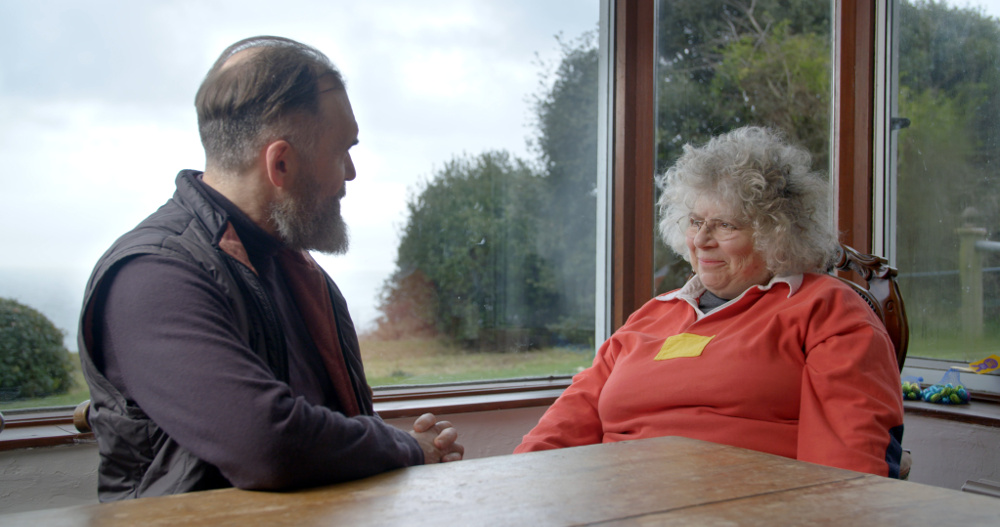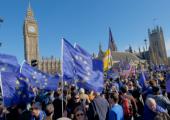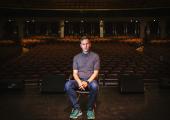Writer and director David Nicholas Wilkinson felt moved to make his reflective, rather melancholy documentary on the 48% who voted to remain in the EU, he says, because nobody else was making one. When it came to funding the project, not a single Brit would invest (though he has German and Irish backers) – potential supporters were apparently too nervous of their names getting out.
Have the values of Remain already become so ignored and so – well, unacceptable? Possibly. Which, of course, makes it all the more crucial that Wilkinson has provided Remainers with this platform to present their arguments and fears, their fury at the lies peddled by Brexiters, and their frustration that, as one pro-Remain demonstrator puts it, we’re abandoning our best option in favour of something unavoidably far worse.
Everyone involved in Postcards from the 48% – director, interviewees, and everyone behind the scenes – is a Remainer. Wilkinson has taken a bold, unashamedly partisan stance, but he maintains a calm, objective, vicarly presence throughout his film, travelling Britain to discuss our predicament. He’s got a strong cohort of contributors, too – from Vince Cable and Nick Clegg through to Lush’s Mark Constantine, Ian McEwan, Bob Geldof and Joan Bakewell – who convey their bewilderment and sometimes despair.
A more worrying omission is Labour: Wilkinson lets Corbyn’s party almost entirely off the hook
Miriam Margolyes (pictured below, with director David Nicholas Wilkinson) makes a brief appearance from what’s apparently the nearest house in mainland Britain to France, arguing that we were fed untruths in the referendum campaign, and that she doesn’t think most Brits are racist (it’s slightly worrying that she even feels she needs to). Clegg is predictably eloquent and convincing, asserting that under Teresa May’s hardline interpretation of the referendum result, it’s as if anyone with internationalist, pro-European views no longer has any right to hold them. And though Wilkinson covers plenty of ground – geographically and thematically – in his 115-minute offering (which, it has to be said, feels its length), there’s a smooth, organic flow to his argument.
There are some fresh insights here. Former SDLP leader Mark Durkan is passionate in explaining the complexities of Brexit playing out against the Good Friday Agreement, though Scotland gets short shrift with comments from just a single voice, the admittedly persuasive Lesley Riddoch. Young demonstrators express their anger that with Brexit occupying almost all of the present government’s attention, much-needed changes in environmental policy, health, housing, social justice and more are simply being ignored. "We don’t have time for this shit," as marcher Daniel bluntly puts it.
But by the end of the film, do we know anything new? Does Wilkinson provide fresh insights into why the vote was lost, or what we can do about it now? Not really. To anyone who glances at the New European, many figures here – Bonnie Greer, Alasdair Campbell, AC Grayling among them – will seem very familiar, and he relies too heavily on the paper’s front-page cartoons. A more worrying omission is Labour: Wilkinson lets Corbyn’s party almost entirely off the hook, even going so far as to argue Labour’s gains in 2017 could be put down to discontent with pro-hard-Brexit Tories, without questioning the party’s deliberately ambiguous stance on the issue. He focuses in on Ruth Cadbury, pro-Remain Labour MP for Brentford and Isleworth, who increased her majority by 11,000 in the 2017 general election. But can she really be held up as representative of her party’s wider Brexit policies?
A more worrying omission is Labour: Wilkinson lets Corbyn’s party almost entirely off the hook, even going so far as to argue Labour’s gains in 2017 could be put down to discontent with pro-hard-Brexit Tories, without questioning the party’s deliberately ambiguous stance on the issue. He focuses in on Ruth Cadbury, pro-Remain Labour MP for Brentford and Isleworth, who increased her majority by 11,000 in the 2017 general election. But can she really be held up as representative of her party’s wider Brexit policies?
You have to wonder, too, about Wilkinson’s partisan approach. In restricting his team to die-hard Remainers, he’s almost certainly also guaranteeing his audience comes from the same group, serving only to create an echo chamber in which we hear repeatedly the anti-Brexit arguments we know already. There’s just one short section – a brief whizz around Stoke-on-Trent – in which he attempts to engage with the frustrations that drove Brexiters to vote the way they did, though young activist Femi Oluwole comments on the tragic irony of the Brexit vote being motivated by systemic failures that the government can now do nothing about, because it’s spending all its time on – you guessed it, Brexit.
Rather than galvanising his audience into righteous fury, however, Wilkinson instead offers up a sad, wistful tribute to the values and the future we once seemed to take for granted. Ian McEwan’s knowing quip about Remainers being "hobbled by a fatal attraction to rational argument" holds equally true for Wilkinson’s thoughtful, respectful, polite film. This is a valuable memorial for future generations, undoubtedly, but it offers little to get us out of our present predicament.
Overleaf: watch the trailer for Postcards from the 48%






 A more worrying omission is Labour: Wilkinson lets Corbyn’s party almost entirely off the hook, even going so far as to argue Labour’s gains in 2017 could be put down to discontent with pro-hard-Brexit Tories, without questioning the party’s deliberately ambiguous stance on the issue. He focuses in on Ruth Cadbury, pro-Remain Labour MP for Brentford and Isleworth, who increased her majority by 11,000 in the 2017 general election. But can she really be held up as representative of her party’s wider Brexit policies?
A more worrying omission is Labour: Wilkinson lets Corbyn’s party almost entirely off the hook, even going so far as to argue Labour’s gains in 2017 could be put down to discontent with pro-hard-Brexit Tories, without questioning the party’s deliberately ambiguous stance on the issue. He focuses in on Ruth Cadbury, pro-Remain Labour MP for Brentford and Isleworth, who increased her majority by 11,000 in the 2017 general election. But can she really be held up as representative of her party’s wider Brexit policies?



